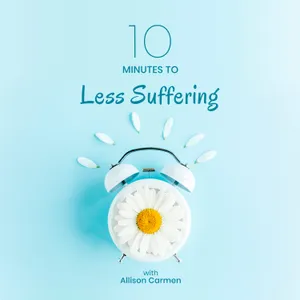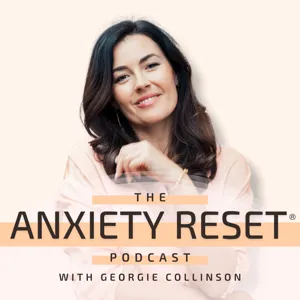Podcast Summary
Breaking Down Milestone Anxiety and Finding Peace in Your Own Path: Don't let societal or familial pressures dictate your life; embrace your own unique journey and timeline, and find comfort in knowing that there is no one "right" way to live or achieve milestones.
Milestone anxiety is the fear of not reaching certain societal or developmental milestones that arise in our 20s, causing stress and pressure to conform to a specific timeline. These expectations can originate from social media, family, or older generations. However, happiness doesn't always come from a conventional way of living or achieving milestones at a specific point in time. It's important to cultivate a greater acceptance of the diversity of paths people have through life and respect one's own journey and path. This episode breaks down the origins, causes, and details of milestone anxiety, how to push back against it, and find solace and reassurance when feeling like you're falling behind.
The Pressure to Meet Societal Milestones in Your Twenties: Don't stress about societal expectations, focus on personal growth and finding happiness in the present. Your timeline is unique and there is no one right way to live your life.
Many people in their twenties feel immense pressure to meet certain societal milestones such as getting married or having kids, which can lead to anxiety and feelings of being behind in life. These expectations are often rooted in traditional ideas of what our lives should look like, passed down from older generations and reinforced by media and peers. However, it's important to recognize that everyone's timeline is different and there is no one-size-fits-all approach to life. Rather than focus on meeting these milestones, it's important to prioritize personal growth and finding happiness in the present moment. Remember, life is a journey and not a race.
Understanding Milestone Anxiety: A Unique Pressure in Today's Society: Milestone anxiety is the pressure to meet traditional life milestones by a certain age, which can cause unease and anxiety. It's important to navigate your own path without succumbing to external pressures.
Milestone anxiety is a unique pressure to achieve traditional life milestones by a certain age, often associated with our 20s and 30s, that can result in feelings of restlessness, unease, and anxiety. While these milestones were achievable for previous generations, today's economic, financial, and social climate has made it harder for younger people to meet them. The pressure to conform to societal norms and the expectations of family and friends can deepen the anxiety and make one feel out of place. Milestone anxiety is not a diagnosable disorder, but it can contribute to or be compounded by generalized anxiety and depression. Understanding this anxiety can help individuals navigate their own paths in life without succumbing to external pressures.
Understanding the Pressures of Milestones in Young People's Lives.: The pressure to meet societal expectations for milestones can create overwhelming feelings of failure and meaninglessness. By understanding these factors, individuals can better navigate the expectations associated with these milestones in their lives.
Young people experience pressure to reach specific milestones, such as having children or getting married, and this pressure can be both internal and external. These expectations can be overwhelming and lead to paralysis when trying to plan for the future. The societal narrative around these milestones creates a sense of failure when they are not achieved, leading to feelings of meaninglessness. Social comparison also plays a significant role in this pressure. Understanding these factors can help individuals navigate these milestones and their associated expectations.
Overcoming Milestone Anxiety: How to Manage Self-Doubt and Comparison: Comparing ourselves to others and ruminating on perceived failures only leads to shame and anxiety. Focus on controllable factors, have a realistic view, and be aware of attention bias to better manage milestone anxiety.
Milestone anxiety is a shared experience that affects the majority of us at some point in our lives. Comparing ourselves to others and feeling like we're falling behind can lead to shame, anxiety, and self-doubt. It's important to recognize that rumination and attributing our perceived failures to personal shortcomings is unhealthy and counterproductive. Instead, we need to focus on things we can control and have a realistic and objective view of our situation. We should also be aware of attention bias, where our brains only focus on information that confirms our biases, leading to a skewed view of reality. By understanding these factors, we can better manage our milestone anxiety and strive towards our goals without letting them consume us.
Overcoming Milestone Anxiety: Navigating Societal Expectations.: Society's expectations can lead to milestone anxiety, causing symptoms of depression and anxiety. Understanding its roots and accepting that milestones don't define success is important for personal growth and happiness.
Milestone anxiety is a common problem that arises due to societal and familial pressures to achieve specific goals at certain ages. It can lead to symptoms of depression, generalized anxiety, and physical tension. The amygdala, responsible for our fear response, can falsely interpret certain situations as dangerous, leading to anxiety. Women are more likely to suffer from milestone anxiety due to societal pressure to meet certain deadlines related to marriage and children. It is important to remember that life experiences are unique to everyone and milestones should not be equated with success or failure. We should strive to go about life in a way that is different and meaningful to us, free from outdated societal expectations.
Breaking Free from Societal Molds and Milestone Anxiety: Understand societal pressure, navigate feelings, and embrace unpredictability to achieve personal goals and growth. Milestones are unique to each individual and should not be restricted by society's expectations.
It is time to break free from outdated societal molds and combat milestone anxiety. Everyone's journey is unique and there is no one-size-fits-all approach to achieving goals and milestones. It is important to understand the root cause of the pressure we feel and navigate our feelings before setting our own timelines and agendas for life. We need to embrace the unpredictability of life and be excited by the feeling that anxiety gives us, as it can often lead to positive change and growth.
Transform Milestone Anxiety into Excitement with Mindset Shift: Embrace the idea of multiple paths to success and authenticity to overcome fear of judgment. Take inspiration from those who forge their own unique journey to live a fulfilled life.
Milestone anxiety can be transformed into excitement by changing our interpretation of shared sensations as well as our mindset. By embracing the idea that there is more than one way of doing something and not being restricted by convention or tradition, we can forge our own unique path to happiness and success. Achieving authenticity is the key to overcoming our fear of being judged and living a fulfilled life. We should take inspiration from those who have found success by pushing back against the conventional path and forging their own unique journey.
Overcoming Milestone Anxiety: Embrace Your Own Journey: Milestone anxiety is a common feeling that stems from comparing ourselves to others and societal expectations. Embrace your unique journey by letting go of comparisons and focusing on your own achievements and pace.
Milestone anxiety often stems from our tendency to compare ourselves to others, which has been exacerbated by social media and societal expectations. To combat this, focus on your own achievements and remember that everyone experiences milestone anxiety. Life doesn't always go according to plan, and that's okay. Society's timeline does not have to be your own, and you can do things at your own pace and still be happy. The key is to stop comparing yourself to others and embrace your own unique journey.
Slowing Down and Finding Support for Anxiety in Your 20s: Don't let anxiety define you - it's just a response, not the truth. Reach out to friends for support and check out informative podcasts like those on iHeartRadio for valuable insights on wellness and other topics.
It's important to slow down and treat anxiety as just a response, not the truth. Remember that you're not alone in experiencing these things, and sharing this episode with a friend may help them too. The psychology and science around our 20s is valuable and needs to be made more accessible. Leaving a positive review or suggestion for future episodes can show support for the podcast. Additionally, there are many other informative and engaging podcasts available on iHeartRadio, such as Freeway Phantom, Beauty Translated, and Deeply Well. These podcasts provide a variety of perspectives and insights on topics ranging from true crime to wellness, all designed to support and expand our knowledge and wellbeing.




